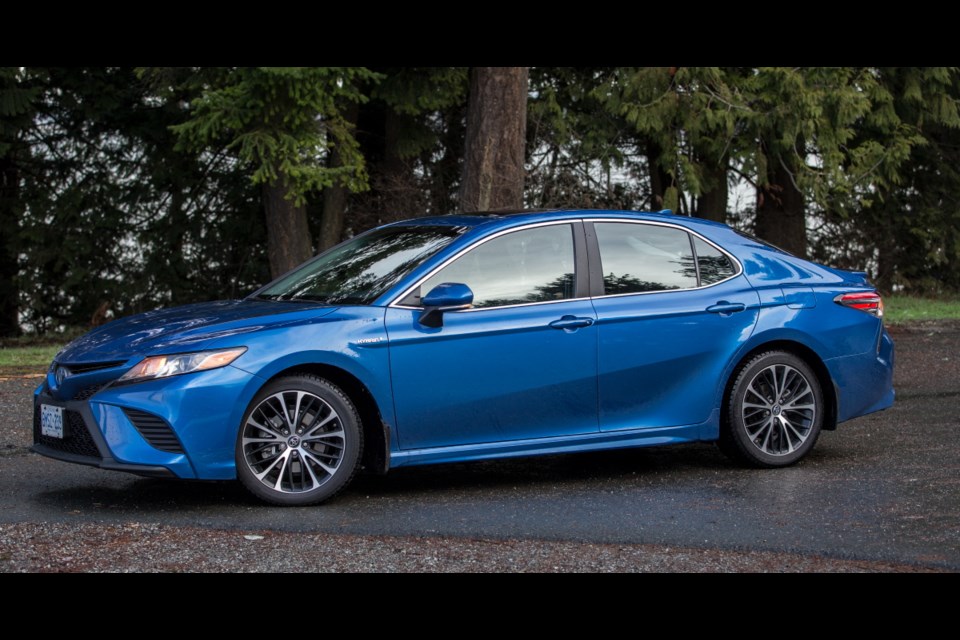The Toyota Camry is the car to watch in 2018. In December, the mid-sized four-door sedan went from twelfth to seventh overall among cars sold in Canada, and the top in its size segment.
Sales shot up almost 22 per cent over the same period last year, no doubt helped by a major overhaul that saw the car receive a new platform.
The Camry outsold competitors such as the Volkswagen Jetta, Honda Accord and Hyundai Sonata almost two to one, an impressive accomplishment.
The 2018 Toyota Camry can be ordered in one of 10 configurations, starting at $26,590. It is available in a gasoline-only model or a fuel-saving gasoline-electric hybrid.
> Automotive news and reviews at timescolonist.com/driving
This is the eighth generation of the nameplate, synonymous with a reliable, if somewhat unexciting, reputation.
This is somewhat unjustified, in my opinion. After all, we typically look to Toyota for reliable, economical cars, not performance cars to take on the Europeans.
But it seems that the Japanese engineers took the criticism to heart, as they seemed to have put a dash more excitement in the new car.
They got their opportunity when the Camry became the latest model to receive their new unibody platform. Toyota seems to embrace four-letter acronyms, so the Camry now rests on the Toyota New Global Architecture platform.
The TNGA is a new modular platform on which Toyota currently builds the Prius and underpins models yet to be built. It expects the new architecture will cut costs by about 20 per cent.
But more importantly, the new platform is 30 per cent stiffer than the vehicle it just replaced.
Remember that part about excitement? With a stiffer chassis — and a lower centre of gravity — the Camry is indeed a livelier car, with eyebrow-raising attributes on country roads.
Keep in mind the higher level of sportiness is found on the Camry’s S line (the SE and the XSE).
Three engines are available, a 2.5-litre four-cylinder, a 3.5-litre V-6 for the power-hungry and a retuned version of the 2.5-litre (now Atkinson cycle) mated to an electric motor and a continuously variable transmission.
The hybrid powerplant produces 208 horsepower and 163 foot-pounds of torque. A 1.6-kWh/ 245-volt nickel-metal hydride battery (curiously, the base LE hybrid comes equipped with a lithium-ion unit) is nestled under the rear seat.
The Hybrid SE comes with a choice of Eco, Normal and Sport driving modes. When left in Sport mode, all thoughts of returning super-low fuel consumption go out the window. The SE stretches out the (virtual) shift point, giving throttle response and excitement top priority.
Throttle back to Eco and you might get the sense that somebody came in the middle of the night and stole one or more cylinders from you.
That makes Normal the logical default, with a good balance of power and economy.
Speaking of economy, Toyota has managed to eke out even more fuel efficiency this year, to 5.3 litres per 100 kilometres in the city and 5.0 on the highway.
There is only one curious change: Toyota quietly reduced the size of the fuel tank, from 64 litres to 49. Even with a slightly better fuel consumption, it drops its range by more than 100 kilometres to 960 km, resulting in more stops for gas.
While it drove well, its brakes were another matter. As a hybrid, the car is equipped with brakes that regenerate power as it decelerates, effectively recharging the battery in the process.
Most times the operation is seamless, but occasionally the brakes seemed to grab a little more than usual. It is transmitted through the soles of the foot as a pulse and the car does not jerk as a result. I would have just expected it would have been smoother, given that Toyota has had more than 20 years of real-world experience with regenerative braking.
The cabin also received a substantive rework, with an emphasis on a more upscale occupant experience. Soft-touch materials and comfy seats make the interior a welcoming place. My SE had leather seats and an infotainment system with an eight-inch screen (lesser models come with a seven-inch screen).
Toyota is pushing its Entune cellphone application. When paired up with the vehicle, it allows for automatic collision notification, stolen vehicle location and emergency assistance.
The SE does not come with built-in navigation. Instead, Toyota has linked its Entune to another app, Scout GPS Link. The idea is that you use your phone — and your phone data plan — to navigate.
Try as I might, the Scout GPS app would not sync with the Toyota. Also note that you need to physically hook up your phone to the car to get this to run — it will not work wirelessly.
At this price range, I would have preferred to have a built-in navigation system.
Overall, there is much to celebrate with the new 2018 Toyota Camry. With all the improvements to the car, and better fuel economy, I fully expect it hold onto its lead as one of the top 10 cars sold in Canada.
THE SPEC SHEET
Type: Mid-sized four-door sedan, front engine, front-wheel-drive
Engine: Gasoline-electric hybrid, 2.5-litre Atkinson-cycle four-cylinder gasoline engine and electric motor, 208 hp and 163 lb.-ft. of torque combined
Battery: 1.6 kWh 245-volt nickel metal hydride
Transmission: Continuously-variable automatic
Dimensions (mm): Length, 4,895; width, 1,840; height, 1,445; wheelbase, 2,825
Curb weight (kg): 1,610
Price (base/as tested): $33,990/ $35,805 (includes $1,715 freight and PDI and $100 AC tax)
Options: Nil
Tires: 235/45 R18 on alloy wheels
Fuel type: Regular
Fuel economy (L/100km): 5.3 city/ 5.0 highway
Warranty: Three years/60,000 km new car, five years/100,000 km powertrain, eight years/160,000 km hybrid components



